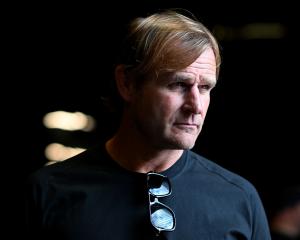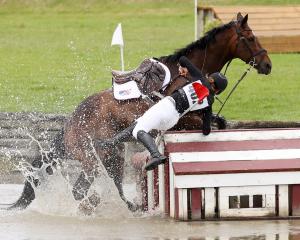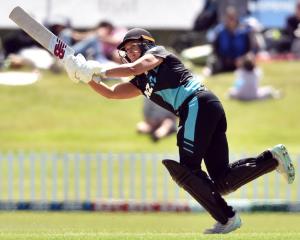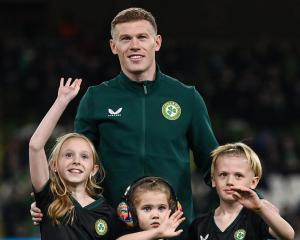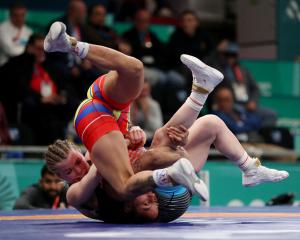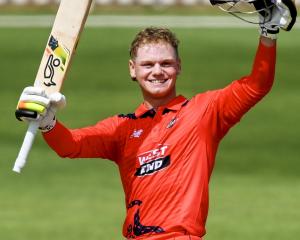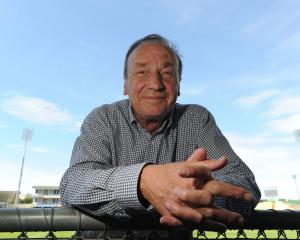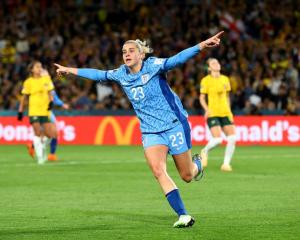Adam Thomson is the greatest player in Highlanders history. Discuss.
No, seriously. Has there been a better player in the blue-gold-maroon than the willowy wonder from Ashburton?
A few years back, the Otago Daily Times co-ordinated the naming of a best Highlanders XV to mark 10 years of Super rugby.
It was (fullback to hooker) Nick Evans, Jeff Wilson, Pita Alatini, John Leslie, Brian Lima, Tony Brown, Byron Kelleher, Isitolo Maka, Josh Kronfeld, Taine Randell, Simon Maling, John Blaikie, Carl Hayman, Anton Oliver and Carl Hoeft.
How would that team look now? I'd suggest Ben Smith might replace Brian Lima, and Tom Donnelly might replace John Blaikie. And in the loose forwards, I'd drop Maka, shift Randell to No 8 and put Thomson at No 6. Jimmy Cowan and Jamie Mackintosh would be other current players to consider, though perhaps they would have to be satisfied with a spot on the bench.
Thomson is a spectacular talent in spectacular form. Right now, he is the most valuable player in New Zealand rugby.
He has speed and skill. He is a dominant presence in the loose and in the lineout. He defends, he covers, he supports. He is the absolute definition of a superstar.
The All Black selectors will be making a huge mistake if they don't include Thomson in the World Cup squad.
• Southern skippers
Someone has pointed out the Southern links among the leaders of the five New Zealand Super 15 teams.
The Highlanders, of course, follow the mighty Mackintosh, a quintessential Southern man who will feast on some Bulls this weekend.
Up the road, the Crusaders are led by the great Richard Hugh McCaw - openside flanker extraordinaire, pilot, genius, rugged hunk - who was born in Oamaru, raised in the Haka Valley and educated in Dunedin.
Further north, the Hurricanes ebb and flow behind Andrew Hore, a son of Central Otago.
And at the Chiefs, the skipperrrrr is Mils Muliaina, who spent most of his formative years down in Invercarrrrgill.
That just leaves Keven Mealamu at the Blues - and even he has a place in Carisbrook folklore, after his match-winning try in the great test against the Springboks in 2005.
• World Cup wonder
What I was going to ask in relation to the Cricket World Cup was:
- Have you been less excited about a major sporting tournament?
- Is our apathy because of (a) the earthquake, (b) the presence of hopeless minnows, (c) the drawn-out schedule, (d) the fact we know the Black Caps won't win it, (e) the time difference, or (f) a little bit of each?
But then along comes an Irish bloke with terrible hair and smites the fastest ton in World Cup history to beat the old enemy, the English.
Just what the cricket doctor ordered.
• Gale-force performance
North East Valley's magnificent 18 all out in club cricket last weekend jogged the memory of one of our readers, who suggested we look back at the 1996-97 season.
Sure enough, there was a bizarre game that summer that featured the same score, a remarkable bowling performance and an innings defeat inside six hours.
University-Grange batted first at Logan Park and posted just 140, with Garth Gallaway top-scoring with 62 and Albion seamer Evan Marshall cleaning up with nine for 44.
Lunch must have tasted great for the Albion boys. But their confidence soon faded.
Albion had progressed to 12 for none when it all went pear-shaped. Ten wickets fell for just six runs inside seven overs. There were seven ducks, and opening batsman Grant Webber top-scored with nine.
The chief destroyer was University-Grange paceman Aaron Gale, who took nine for nine.
Albion followed on and did a little better, reaching 69 in its second innings. Gale added six for 26 to finish with match figures of 15 for 35.
• Doing their bit
A quiet word of praise for the sporting community and the role it is playing in helping restore the spirit of Christchurch.
From Daniel Vettori's magnanimous donation of his memorabilia, to Ryan Nelsen's dash home from England, to fund-raising contributions from Cory Jane, Neemia Tialata and Iain O'Brien, there have been some admirable gestures.
There are good local initiatives too, with golf at Chisholm Park, triathlons in Wanaka and an Otago basketball-netball bash - all fine ideas.
People like to say sport isn't important. And certainly, in the shadow of a devastating natural disaster, it takes its rightful place.
But sport is important - for uniting people and giving them a welcome distraction and, in many thousands of cases, paying their wages.
At a time like this, sport is also a magnificent vehicle for raising much-needed funds for our brothers and sisters in Canterbury.
• Opportunity lost?
I am a big fan of the New Zealand Sports Hall of Fame.
I've written about it several times, and I have often lamented the fact our sporting public does not engage in feverish debate about which athletes are Hall-worthy, like you see in the United States.
I also think the Hall should be subjected to vigorous debate once a year when it announces its latest inductees. And I wonder if it could have been a tad broader-minded this year.
All Black great Michael Jones was finally and deservedly inducted at the Halberg Awards, but it was a surprise to see yet another runner get the nod.
Bill Baillie, whose international achievements were relatively modest, became the sixth runner inducted in the space of five years. Overkill, surely. There are now 28 athletics entries in the Hall, twice the number of rugby league, hockey, cycling, basketball and football combined.
It was the perfect time to induct the 1982 All Whites. That they are not in the Hall - Wynton Rufer is football's sole entry - is a real shame.
Hall of Fame boss Ron Palenski tells me a panel of nine, including three inductees, three sports representatives and three from the news media, is convened to assess candidates, who can be nominated by anybody.
He says the All Whites have been nominated several times but have never had the numbers to make the final cut.
Consider this the start of a campaign: join with me in pushing for the 1982 All Whites to be inducted into the Hall of Fame in 2012.
• To owl and back
It is with great regret the sporting world learns of the death of the Atletico Junior owl.
The injured bird died from shock two days after being kicked off the field by a player in a game between two Colombian football clubs.
The owl, Atletico's mascot, had fluttered down on to a spot near the pitch.
This fowl play obviously angered Pereira defender Luis Moreno, who promptly walked over and booted the hooter away.
An environmental agency is investigating possible sanctions against Moreno for the owlicide.

